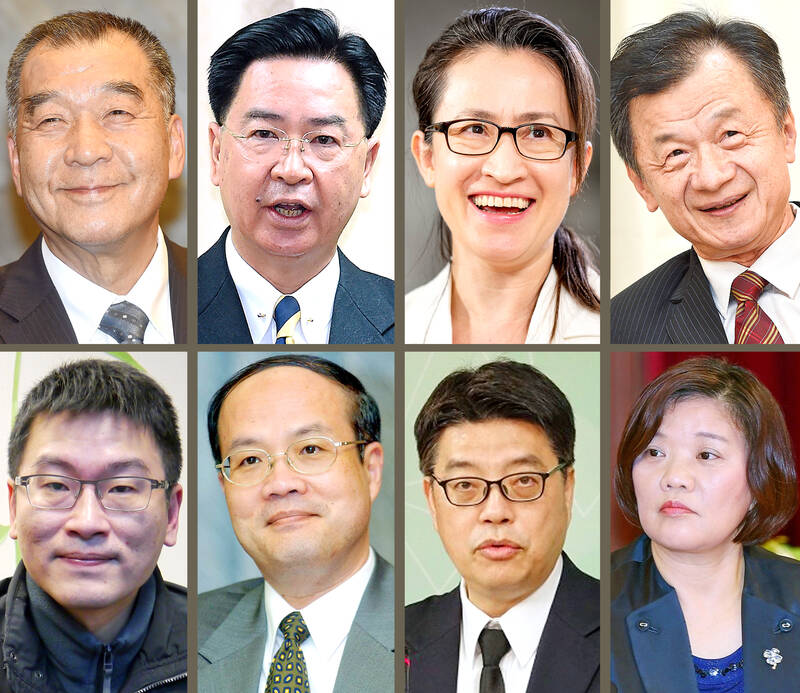The foreign affairs, national defense and Mainland Affairs Council (MAC) ministers are to remain in their posts under the new Cabinet, incoming premier Chen Chien-jen (陳建仁) wrote on Facebook yesterday.
The Central News Agency (CNA) quoted Deputy Minister of the Interior Chen Tsung-yen (陳宗彥), who is the new Cabinet spokesperson, as saying that the appointments were made after a discussion between President Tsai Ing-wen (蔡英文) and Chen Chien-jen.
Minister of Foreign Affairs Joseph Wu (吳釗燮), Minister of National Defense Chiu Kuo-cheng (邱國正) and MAC Minister Chiu Tai-san (邱太三) are expected to continue to carry out defense, foreign affairs and cross-strait policies, Chen Tsung-yen said.

Photo: Taipei Times
The CNA report quoted an anonymous source as saying that Chiu Kuo-cheng is to stay in his post to facilitate the extension of mandatory military service this year, while Wu and Representative to the US Hsiao Bi-khim (蕭美琴) are to remain “to continue practical diplomacy.”
The CNA report said that former Taipei City councilor Liang Wen-chieh (梁文傑) would be the new MAC deputy minister, and quoted an anonymous source as saying that the appointment would help foster new talent in cross-strait affairs.
Straits Exchange Foundation Vice Chairman and Secretary-General Jan Jyh-horng (詹志宏) and MAC Deputy Minister Chiu Chui-cheng (邱垂正) are to switch positions, while MAC Deputy Minister Wu Mei-hung (吳美紅) would become Ocean Affairs Council (OAC) Deputy Minister and OAC Deputy Minister and Coast Guard Administration Director-General Chou Mei-wu (周美伍) would remain in his post, it said.
On Saturday, Chen Chien-jen on Facebook named former Keelung mayor Lin Yu-chang (林右昌) as minister of the interior, Deputy Minister of Culture Hsiao Tsung-huang (蕭宗煌) as director of the National Palace Museum, and Kaohsiung Deputy Mayor Shih Che (史哲) as the minister of culture.
Minister of Education Pan Wen-chung (潘文忠), Minister of Justice Tsai Ching-hsiang (蔡清祥), Minister of Transportation and Communications Wang Kwo-tsai (王國材), Minister of Health and Welfare Hsueh Jui-yuan (薛瑞元), Minister of Digital Affairs Audrey Tang (唐鳳) and Environmental Protection Administration Minister Chang Tzi-chin (張子敬) would all remain in their posts, Chen Chien-jen said.
He is also retaining Council of Agriculture Minister Chen Chi-chung (陳吉仲), Financial Supervisory Commission Chairman Huang Tien-mu (黃天牧), Veterans Affairs Council Minister Feng Shih-kuan (馮世寬), Council of Indigenous Peoples Minister Icyang Parod and Hakka Affairs Council Minister Yiong Con-ziin (楊長鎮).
While former Presidential Office deputy secretary-general Lee Chun-yi (李俊俋) is rumored to become the new deputy minister of labor, former Taoyuan mayor Cheng Wen-tsan (鄭文燦), who is to become vice premier, was quoted by CNA yesterday as saying that the full Cabinet list would be completed today, with the names of new deputy ministers to be announced this afternoon.
Premier Su Tseng-chang’s (蘇貞昌) Cabinet is to officially resign today, clearing the way for the new Cabinet to be sworn in during a handover ceremony tomorrow.

DAREDEVIL: Honnold said it had always been a dream of his to climb Taipei 101, while a Netflix producer said the skyscraper was ‘a real icon of this country’ US climber Alex Honnold yesterday took on Taiwan’s tallest building, becoming the first person to scale Taipei 101 without a rope, harness or safety net. Hundreds of spectators gathered at the base of the 101-story skyscraper to watch Honnold, 40, embark on his daredevil feat, which was also broadcast live on Netflix. Dressed in a red T-shirt and yellow custom-made climbing shoes, Honnold swiftly moved up the southeast face of the glass and steel building. At one point, he stepped onto a platform midway up to wave down at fans and onlookers who were taking photos. People watching from inside

A Vietnamese migrant worker yesterday won NT$12 million (US$379,627) on a Lunar New Year scratch card in Kaohsiung as part of Taiwan Lottery Co’s (台灣彩券) “NT$12 Million Grand Fortune” (1200萬大吉利) game. The man was the first top-prize winner of the new game launched on Jan. 6 to mark the Lunar New Year. Three Vietnamese migrant workers visited a Taiwan Lottery shop on Xinyue Street in Kaohsiung’s Gangshan District (崗山), a store representative said. The player bought multiple tickets and, after winning nothing, held the final lottery ticket in one hand and rubbed the store’s statue of the Maitreya Buddha’s belly with the other,

‘NATO-PLUS’: ‘Our strategic partners in the Indo-Pacific are facing increasing aggression by the Chinese Communist Party,’ US Representative Rob Wittman said The US House of Representatives on Monday released its version of the Consolidated Appropriations Act, which includes US$1.15 billion to support security cooperation with Taiwan. The omnibus act, covering US$1.2 trillion of spending, allocates US$1 billion for the Taiwan Security Cooperation Initiative, as well as US$150 million for the replacement of defense articles and reimbursement of defense services provided to Taiwan. The fund allocations were based on the US National Defense Authorization Act for fiscal 2026 that was passed by the US Congress last month and authorized up to US$1 billion to the US Defense Security Cooperation Agency in support of the

‘COMMITTED TO DETERRENCE’: Washington would stand by its allies, but it can only help as much as countries help themselves, Raymond Greene said The US is committed to deterrence in the first island chain, but it should not bear the burden alone, as “freedom is not free,” American Institute in Taiwan Director Raymond Greene said in a speech at the Institute for National Defense and Security Research’s “Strengthening Resilience: Defense as the Engine of Development” seminar in Taipei yesterday. In the speech, titled “Investing Together and a Secure and Prosperous Future,” Greene highlighted the contributions of US President Donald Trump’s administration to Taiwan’s defense efforts, including the establishment of supply chains for drones and autonomous systems, offers of security assistance and the expansion of